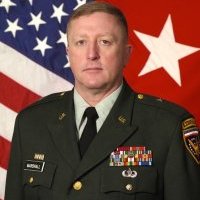Jeffery Marshall
George Mason University, Public and International Affairs, Graduate Student
- International Relations, International Relations Theory, Public Administration, International Politics, Public PolicyStudies, Military Science, and 18 moreMilitary and Politics, Military Ethics, Knowledge Management, Africa, African Studies, Security, Strategy, Decision Making, Planning, Analysis, Decision Support Systems, Training, Capacity Building, Engagement, Capability Building, Campaign Planning, Assumptions, and Public Policyedit
As more non-state actors enter on the world stage and exert influence and act on their own behalf, can they be held morally accountable? The paper will discuss the key requirements for individual moral agency and then show how a group... more
As more non-state actors enter on the world stage and exert influence and act on their own behalf, can they be held morally accountable? The paper will discuss the key requirements for individual moral agency and then show how a group can have the same attributes and be a collective moral agent. It will then review applicable theory to build the new institutional collective moral framework. The key is to support the notion that states are collective moral agents and then to show that the state is simply one well defined type of institution with an established and enforceable governance structure and personæ. Next, it will use this theory to build the framework.
This paper takes up a debate on whether Israel exerts an undue influence on US policy or not. Using both quantitative and qualitative analysis, the paper concludes that US policy results more from path dependency than specific Israeli... more
This paper takes up a debate on whether Israel exerts an undue influence on US policy or not. Using both quantitative and qualitative analysis, the paper concludes that US policy results more from path dependency than specific Israeli lobbying efforts. US support to Israel began an entrenched path around 1972, largely as a result of the near-US intervention in Jordan during the civil war started by Black September. Prior to 1972, in spite of 3 wars, US aid and support was minimal. When the US saw the need to react swiftly to events to in the Middle East, they changed the Israeli policy. The massacre at the 1972 Olympic games of Israeli athletes further set the path into stone. US policy most likely will not significantly alter unless there is a path-breaking event.
This paper reviews the need for an African Standby Force and the capabilities it requires. It then reviews the current status of the ASF. Finally, it makes specific recommendations to bridge capability and training gaps.
Research Interests:
Research Interests:
This book, published by National Defense University Press, examines the process of building partnership capability and capacity. Part I discusses the requirements to effectively engage partners and to manage the capability and capacity... more
This book, published by National Defense University Press, examines the process of building partnership capability and capacity. Part I discusses the requirements to effectively engage partners and to manage the capability and capacity building process. Part II analyzes the current United States capabilities to manage the process. Part III provides specific recommendations to fix gaps noted between Part I and Part II.
